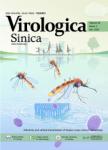TRAF7 negatively regulates the RLR signaling pathway by facilitating the K48-linked ubiquitination of TBK1
作者机构:College of Life ScienceJiangxi Normal UniversityNanchang330022China
出 版 物:《Virologica Sinica》 (中国病毒学(英文版))
年 卷 期:2023年第38卷第3期
页 面:419-428页
核心收录:
学科分类:1004[医学-公共卫生与预防医学(可授医学、理学学位)] 100401[医学-流行病与卫生统计学] 10[医学]
基 金:National Natural Science Foundation of China(Grant Nos.81971502 82060298 31570876)
主 题:TANK-Binding kinase 1(TBK1) Type I interferon TRAF7 Ubiquitination Innate immunity
摘 要:TANK-binding kinase 1(TBK1)is a nodal protein involved in multiple signal transduction *** RNA virus-mediated innate immunity,TBK1 is recruited to the prion-like platform formed by MAVS and subsequently activates the transcription factors IRF3/7 and NF-κB to produce type I interferon(IFN)and proinflammatory cytokines for the signaling *** this study,TRAF7 was identified as a negative regulator of innate immune ***7 interacts with TBK1 and promotes K48-linked polyubiquitination and degradation of TBK1 through its RING domain,impairing the activation of IRF3 and the production of IFN-β.In addition,we found that the conserved cysteine residues at position 131 of TRAF7 are necessary for its function toward *** of TRAF7 could facilitate the activation of IRF3 and increase the transcript levels of downstream antiviral *** data suggest that TRAF7 negatively regulates innate antiviral immunity by promoting the K48-linked ubiquitination of TBK1.



